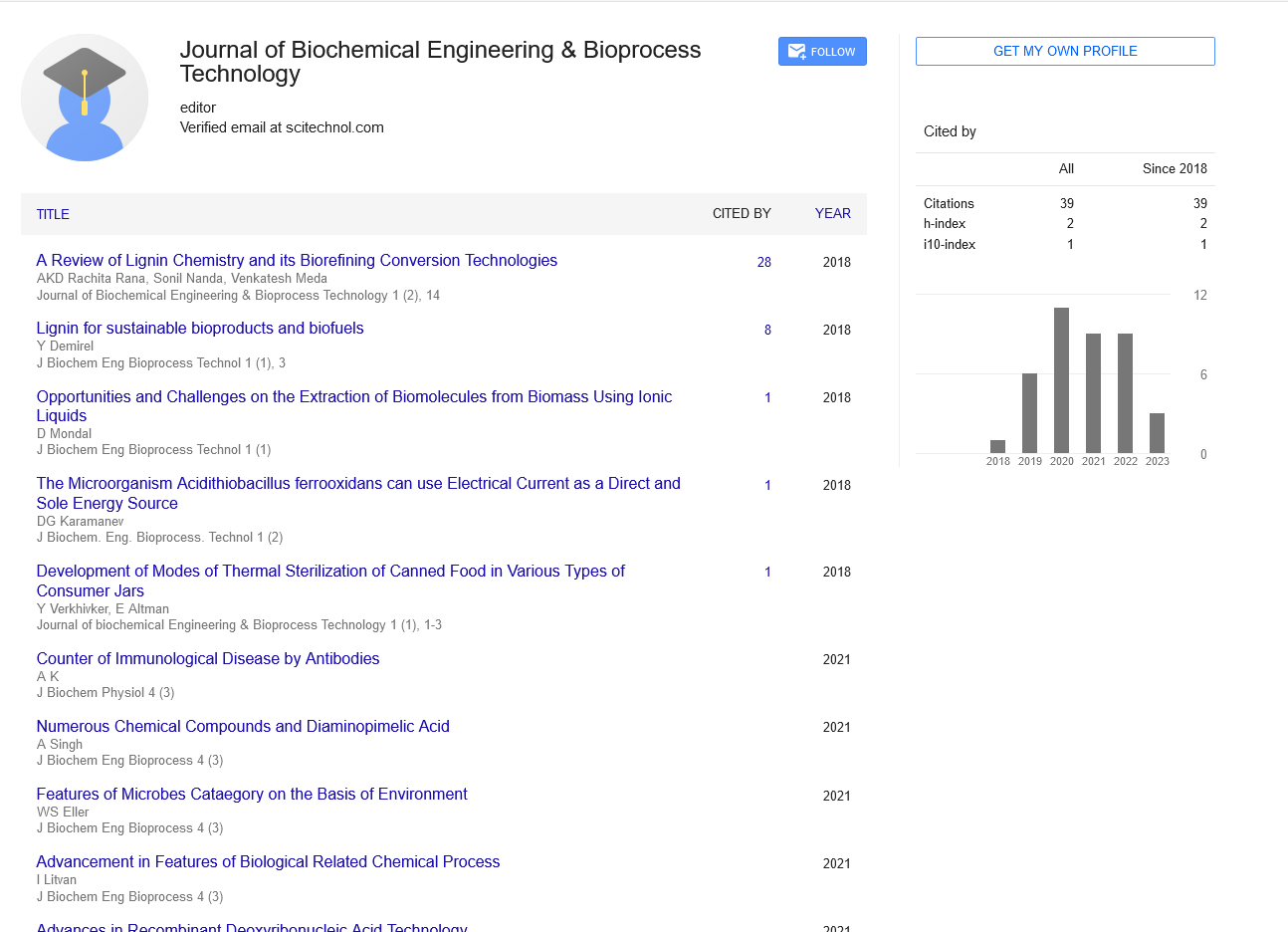Perspective, J Biochem Eng Bioprocess Vol: 6 Issue: 2
Emerging Technologies in Biochemical Engineering: From Synthetic Biology to CRISPR-Based Tools
Luna Ellis*
1Department of Biochemical Engineering & Bioprocess Technology, University of Sao Paulo, Sao Paulo, Brazil
*Corresponding Author: Luna Ellis,
Department of Biochemical Engineering &
Bioprocess Technology, University of Sao Paulo, Sao Paulo, Brazil
E-mail: ellisluna@gmail.com
Received date: 22 May, 2023, Manuscript No. JBEBT-23-106939;
Editor assigned date: 24 May, 2023, Pre QC. JBEBT-23-106939 (PQ);
Reviewed date: 15 June, 2023, QC No. JBEBT-23-106939;
Revised date: 22 June, 2023, Manuscript No. JBEBT-23-106939 (R);
Published date: 29 June, 2023, DOI: 10.35248/jbebt.1000063
Citation: Ellis L (2023) Emerging Technologies in Biochemical Engineering: From Synthetic Biology to CRISPR-Based Tools. J Biochem Eng Bioprocess 7:2.
Keywords: Bioprocess
Description
Emerging technologies are revolutionizing the field of biochemical engineering, offering new tools and approaches to enhance bioprocesses and drive sustainable production. This study provides a brief overview of the recent advancements in emerging technologies and their applications in biochemical engineering. It explores key technologies such as synthetic biology, genome editing (including CRISPR-based tools), and high-throughput screening methods. The study discusses how these technologies enable the design and optimization of microbial systems, the engineering of enzymes, and the development of novel bioprocesses. Furthermore, it highlights the potential of emerging technologies in addressing challenges in areas such as biofuel production, bioremediation, and biopharmaceutical manufacturing.
Synthetic biology: Designing and engineering biological systems
Synthetic biology combines principles from engineering and biology to design and construct novel biological systems. This section explores the applications of synthetic biology in biochemical engineering, including the design of genetic circuits, biosensors, and gene expression systems. It discusses the use of standardized genetic parts, modular assembly, and computer-aided design tools for the construction of complex biological systems. Additionally, it highlights how synthetic biology enables the engineering of microorganisms for the production of valuable compounds, such as biofuels, pharmaceuticals, and chemicals.
CRISPR-based genome editing: Precise modification of genetic material
CRISPR-based genome editing has revolutionized the field of genetic engineering by providing a versatile and precise tool for modifying genetic material. This section discusses the applications of CRISPR-based tools in biochemical engineering, including gene knockouts, gene insertions, and gene modifications in microbial hosts.
It explores the potential of CRISPR-based techniques for metabolic pathway engineering, strain improvement, and optimization of bioprocesses. Furthermore, it highlights the advancements in CRISPRbased technologies, such as base editing and epigenetic modifications, and their potential in expanding the scope of genetic engineering.
High-throughput screening: Accelerating discovery and optimization
High-throughput screening methods enable the rapid screening and characterization of a large number of variants or conditions. This section explores the applications of high-throughput screening in biochemical engineering, including enzyme screening, strain selection, and optimization of process parameters. It discusses techniques such as robotic automation, microfluidics, and miniaturization that enable the screening of diverse genetic libraries and process conditions. Additionally, it highlights the integration of high-throughput screening with computational modeling and machine learning for the design and optimization of bioprocesses.
Applications in biochemical engineering
Emerging technologies have diverse applications in biochemical engineering, addressing challenges in various fields. This section provides examples of applications, including biofuel production, bioremediation, and biopharmaceutical manufacturing. It discusses how emerging technologies enable the engineering of microorganisms for the production of biofuels with improved yields and properties. It explores their potential in bioremediation, where engineered microorganisms can efficiently degrade pollutants. Furthermore, it highlights how emerging technologies contribute to the development of biopharmaceutical manufacturing processes, enabling the production of complex therapeutic proteins and improving their quality and yield.
Challenges and future perspectives
While emerging technologies hold great potential, challenges need to be addressed for their widespread adoption. This section discusses the limitations of current techniques, including off-target effects in genome editing and the need for improved high-throughput screening platforms. It emphasizes the importance of ethical considerations and regulatory frameworks in the application of emerging technologies. Furthermore, it highlights future directions, such as the integration of multi-omics data analysis, automation, and advanced modeling approaches, to further advance biochemical engineering and enhance bioprocess optimization.
Conclusion
Emerging technologies, including synthetic biology, CRISPR-based genome editing, and high-throughput screening, are revolutionizing biochemical engineering. They offer new tools and approaches to optimize microbial systems, engineer enzymes, and develop novel bioprocesses. The applications of these technologies in biofuel production, bioremediation, and biopharmaceutical manufacturing demonstrate their potential in driving sustainable and efficient production processes. However, challenges remain, and continued research and development are necessary to overcome limitations and ensure the responsible and ethical application of emerging technologies in biochemical engineering.
 Spanish
Spanish  Chinese
Chinese  Russian
Russian  German
German  French
French  Japanese
Japanese  Portuguese
Portuguese  Hindi
Hindi 